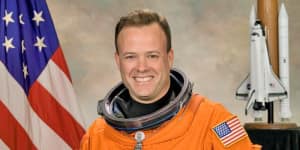Former Astronaut Ron Garan Shares his ‘Orbital Perspective’

Ron Garan, former astronaut and Embry-Riddle graduate, shares his experiences from his 71 million mile journey through in his new book, “The Orbital Perspective: Lessons in Seeing the Big Picture from a Journey of 71 Million Miles.” While clamped to a robotic arm during a spacewalk to replace a 500-pound nitrogen tank, NASA astronaut Ron Garan peered down at the International Space Station and the swirling hues of the Earth spinning 240 miles below him.
“I was looking at this amazing accomplishment of humanity against the beautiful backdrop of our Earth,” he said. “I wondered why isn’t life on our planet as beautiful as the view from space.”
Garan visited the Busboys & Poets bookstore in Washington, D.C., this week on the first stop of his book tour to promote “The Orbital Perspective: Lessons in Seeing the Big Picture from a Journey of 71 Million Miles.” Garan, an Embry-Riddle Worldwide graduate, traveled more than 71 million miles in 2,842 orbits around the Earth on two trips to the International Space Station.
“When you look down from an orbital perspective, we are all riding through the universe on this spaceship called Earth,” he said. “I really left space and returned to Earth with a call for action.”
In 2008, he was a mission specialist aboard Space Shuttle Discovery when it docked at the space station during a 13-day mission. He spent more than 20 hours in three spacewalks doing maintenance on the space station and building a Japanese laboratory. In 2011, Garan boarded the Soyuz spacecraft with two Russian astronauts and spent more than five months conducting microgravity experiments on the space station with a crew of American, Russian and Italian astronauts.
Since retiring from NASA in 2013, the 53-year-old father of three sons has focused on humanitarian efforts inspired by the orbital perspective or his “epiphany in slow motion” that he experienced during his time in space. Garan believes that harnessing technology and collaborating with international partners will help solve some of the world’s enduring problems. He founded Manna Energy Limited, which developed a carbon credit program to fund water treatment programs to provide clean water to more than 4 million people in Kenya. Working with the U.S. Agency for International Development, he led an international coalition called Unity Node to develop an open-source data platform tool to connect humanitarian organizations around the world.
Garan doesn’t believe governments can solve global problems on their own because politicians usually focus on national interests. “It’s clear we have been acting in a very two-dimensional way. It’s us versus them, and we tend to demonize or ostracize those we don’t agree with,” he told the audience in Washington, D.C. “That’s probably more true in this town than anywhere else.”
Garan said he had mixed feelings when the space shuttle program was terminated, but he believed it was important to shift funding to create a transportation infrastructure on the moon to launch deep-space expeditions, including trips to Mars. Garan believes it was shortsighted when funding for that program was canceled. Private companies have now partnered with NASA, and Space X as launched unmanned rockets on supply runs to the space station.
A retired colonel, Garan served with the Air Force in Germany as an F-16 fighter pilot ready to combat the Russians during the Cold War. After he became an astronaut, his former enemies became colleagues. As he was waiting to climb aboard the Soyuz spacecraft in Kazakhstan with two Russian astronauts, he looked up and saw the Russian and American flags flying together, and he was struck by what is possible when people and countries work together.
“The landscape of our entire society is changing drastically,” he said. “It is within our power to eliminate the suffering and conflict on our planet.”
